- Home
- James A. Michener
Caribbean Page 2
Caribbean Read online
Page 2
But that did not keep her agile mind from traveling even further than he had gone, and she reasoned: ‘Remember the legends, Bakámu? That we came from a great water to the south, down there, and that when we came here we first settled on the sunrise side where the waves are intolerable? There all bad things happened to us till we came around in our canoes to the sunset side. Then we prospered.’
Bakámu nodded, for that was the accepted truth of his people, and his own experience confirmed the old stories, for when he had first started exploring in his canoe he had paddled and sailed around the island, and on the sunrise side had encountered only trouble and destructive waves and forbidding cliffs, and he had been wise enough to detect that the ocean, the one to be called the Atlantic, controlled a far more powerful type of magic than the sea which would come to be known as the Caribbean: ‘No protection over there. Powerful waves. Darker, too,’ and then he added the fact which really condemned the sunrise side: ‘No fish.’
He was widely admired in his village, and in other villages along the sunset coast, as a prodigious fisherman who knew the secrets of the deep. He would remain for hours in his canoe, long spear at the ready, awaiting the arrival of fish in the waters below, and usually he had anticipated where they would come. Now he paddled far to the west trailing a huge manatee that had strayed into these waters, and he stayed with the great sea animal even when he lost sight of the coast, for he knew that if he could somehow bring that huge beast to land, all the villages along the sunset side would have enough meat for feasts untold.
As Bakámu chased the ponderous creature, almost as big as a small whale, one of the raging storms that hammered at the island from time to time, a dreaded hurricane, swept in, and for three terrible days the waves were so tumultuous that even the manatee had to find refuge, while Bakámu’s canoe spun and wallowed in the cavernous waves. Shipping his paddle and lying prone in the bottom of his canoe, he gave thanks to the Great Spirit who had commanded him: ‘Make your canoe more sturdy than the others, against the storms,’ but even so at several moments when the waves were stupendous, he thought he was doomed. He did not cry out in despair, nor did he quake with fear; instead, facedown, he clung tightly to the canoe he had built and muttered: ‘Man comes, man goes. On sea same as on land.’ And then he thought of his woman alone in their hut, and his worry was for her, because in a hurricane at sea, men died swiftly in one shattering destruction of their canoe; on land, death was slower and more painful as dwellings flew apart and great trees fell, often pinning the people to the ground and holding them there until they died.
While he was having these agitated thoughts at sea, Tiwánee was in their hut, protected by her croton hedge and wondering in terror what might be happening to her man, and like others in the village when the hurricane abated she looked out to the empty but still turbulent sea and concluded: Oimé! The great fisherman, the daring explorer, is dead. And the villagers, after burying those who had died on land, helped organize a mourners’ ceremony for Bakámu who had died at sea.
When two boys playing along the shore spotted a canoe approaching two days after the great storm had subsided they began to shout, and everyone streamed down to the water’s edge to see this amazing sight, their man Bakámu bringing his canoe back through the waves and towing behind the body of the manatee he had tracked again when the storm subsided. It was then, in that moment of joy, that an old man cried: ‘He has struggled back!’ and the name Bakámu gained even greater honor.
Now, as they talked about the strangers in the big canoes and he reminded Tiwánee of how desolate the sunrise side was, she asked thoughtfully: ‘Is it as bad over there as our legends say?’
‘Worse.’
‘But if our early ones found it unkind, won’t the newcomers want to leave?’
‘Maybe so.’
‘And won’t they do what our people did? Come over here to the better side?’
‘They might.’
At this point she began the kind of intense interrogation she engaged in when her suspicious mind felt the need for more specific knowledge: ‘You say they were darker in face than we are?’ Yes. ‘And their women crept about like frightened animals?’ Yes.
Continuing with her questions, her inquisitive face close to his, she uncovered two facts about which Bakámu wanted to talk in greater detail, for he too was eager to understand the newcomers and fathom their intentions. Accordingly, he volunteered this information: ‘Their leader, a bigger and rougher man, carried a huge club which he often swung about his head, driving everyone back. And once I saw him so angered that he struck a man with it, knocking him flat.’
‘Killing him?’
‘I think so. Others carried him away.’
Now came a painful pause, for Bakámu wanted to share with his wife a fearful doubt he had been unwilling to admit even to himself: ‘Tiwánee, I must say this. Soon after, the ones who took the dead man away came back with large pieces of meat. Not agouti, not manatee, and they threw the meat into a pot and prepared for a feast.’
Tiwánee listened to the awesome words, sucked in her breath, and asked quietly: ‘You think they ate their own brother?’ When Bakámu remained silent, she broke into a wail, crying: ‘These are evil times,’ and terror fell upon them both.
Her questioning had been so orderly and its revelations so conclusive that she began that afternoon to take those prudent steps which would enable her to protect her family and herself against the brutal newcomers when they came over the mountains, which she was certain they would.
That phrase—‘when they came over the mountains’—dominated all her thinking in the days ahead. She said it as she broke branches to mask the obvious approaches to their hut, and she repeated it when she asked Bakámu to fetch her a branch of very hard wood from the forest. ‘What are you going to do with it?’ he asked, and watched in amazement as she cut an arm’s length of the wood, then sharpened one end to a fine point, which she hardened in her cooking coals. When she did this, the delicate tip burned away, but then she whittled the remaining end to a new and harder tip until at last she had a short, fire-hardened, deadly dagger.
Bakámu was astonished to see her do this. The Arawaks on this and other islands were one of the most peaceful peoples in the world: they had no word for war, for none was needed, and they reared their children in abounding love. They revered their old people and eased them along their journey through the years, bringing them portions of maize and collecting taro roots for them, and even sometimes sharing with them a succulent little coney if they caught one sunning itself beside its burrow. They lived in harmony with their small universe, reveling in the abundance and beauty of the island and accepting the hurricanes when they roared in to remind them that nature was omnipotent, not man.
Indeed, their lives were measured principally by the sunset. At the end of each long day it was customary for them to sit along the shore in the evening and watch the glorious orb of the sun as it dipped swiftly toward the distant waves; then mothers assured their children: ‘It will come back.’ When the sun disappeared the Arawaks renewed their faith, and in the following darkness retired in peace to their small circular dwellings and an evening meal.
Tiwánee, as the mother of a lively baby girl, named Iorótto after the hummingbird, realized that she had a special responsibility for protecting and cultivating the child’s promised beauty. The Arawaks were one of several tribes throughout the world who believed that the human face was most attractive when the forehead sloped sharply backward from the eyebrows; a head which rose directly upward from the nose bridge was considered gross and somehow offensive. So, each night, in a patient effort to make Iorótto more beautiful, her mother bound against her forehead a wide, flat board which would press the frontal part of the skull slowly backward until the desired slant was attained. In this position the little girl slept, for among the Arawaks beauty was both prized and desired.
As the sun set and little Iorótto went peacefully to sleep, the
strangers on the sunrise side of the island were settling in. They were the Carib Indians, who had come north from the great rivers of what would be called South America, a wildly different lot from the peaceful Arawaks. They gloried in war and organized their society solely for its conduct. A fierce, terrible people, they were cannibals who fought any strangers, not only to subdue them but also to eat them.
Precisely as Tiwánee had predicted, they had been on the ocean side of the island only briefly when their leader, one Karúku, a violent man in his mid-twenties, with black hair shorn so that it fell down toward his eyes, decided that his clan must move across the island toward what he was sure would be a gentler climate with food and fish more abundant. But he was impelled equally by the fact that this sunrise side was unpopulated and therefore provided no targets for the warfare in which he excelled. He longed to have his warriors intermingled with people against whom they could exercise their martial arts and from whom they could take prisoners, but he also had a strong personal motive: on the voyage north from the jungles of the Orinoco River his wife had died, and since all the women in the three canoes were taken, he was left without a wife and was not happy about it. Guessing that the other side of the island must be more clement and possibly inhabited, he directed his Carib warriors to prepare for scouting expeditions into the mountains in search of settlements from which he might capture a wife.
This tactic of stealing women was an important part of Carib culture, one that had been practiced for hundreds of years; the warriors might eat the men they captured in battle, and they castrated young boys to fatten them like capons for later feasts; but they did not eat women, they were too valuable for breeding and as the creators of future warriors.
So with varied purposes Karúku the Carib laid plans to conquer whatever he might find on the island, and the end of the battle was clear in his mind: the extermination of the others.
In many corners of the world at this time similar expeditions were being launched with similar goals, as groups of human beings, finding it impossible to coexist with those of a different color or religion, were concluding that extermination was the only solution. This conviction would continue to scar the world for the next eight hundred years and probably long after that.
Karúku was a formidable foe, for he had demonstrated in forays along the Orinoco his skill in warfare and had left that amiable river primarily to find a new area which he could dominate. He was not only skilled in face-to-face battle, wielding a huge war club violently and cracking any skulls that came in the way, but he also had a keen sense of tactics and strategy taught him by his father and grandfather, who had also been awesome warriors.
The heritage of the Caribs was brutality, warfare and little else. They would bequeath to the world words originating in force and terror: cannibal, hurricane, the war canoe, the manly cigar, the barbecue, in which they roasted their captives. As they marched they had war drums but only a few songs of battle and none of love. Their food habits were totally primitive and graced with none of the refinements that the Arawaks and other tribes had developed; the Caribs ate by grabbing with dirty fingers scraps of meat from the common platter, the men invariably snatching theirs before the women, who were allowed the leftovers. Their canoes were heavy and crude, not the flying things of delicate line created by others, and even their personal adornment was invariably of a warlike nature, and it was the men, never the women, who were decorated with the whitened bones of their victims.
But like the military Spartans of ancient Greece, who also seemed brutal when compared to the more cultured Athenians, the Caribs were very good at what they chose to do, and were the terrors in any area into which they wandered. They believed that by eating the most powerful of their enemies they inherited their prowess, and that by taking the most beautiful and healthy of their women they enhanced the vitality of their own group; in this latter belief they were, of course, correct. They were a hybrid group of people, constantly reinforced by fresh blood, and they profited from the brutal strength that such hybridism often produces.
When Karúku and three others left the sunrise side one morning to explore their newfound island, they moved stealthily and with intense purpose, and after they had probed through the forests for some hours without spotting any signs of habitation, they began to ascend the high mountains that filled the center of the island. Night overtook them before they had seen anything, but this did not distress them, for they were accustomed to sleeping in the open, and for food, they carried with them fragments of fish and meal of which they would eat sparingly, for they could not anticipate who or what they might encounter before they returned to their own people.
On the afternoon of the second day they came upon a sight that delighted them: it was a clearing in the forest and they concluded that it must have been made purposefully by human beings, for there grew in a consciously designed pattern the tuberous manioc, a major source of food. ‘They’re here!’ Karúku cried, and the way in which he uttered the words betrayed not joy in finding that other humans were on the island, but grim satisfaction that his group would soon once more be in combat with a new foe for the possession of a new land.
For the rest of the day the spies moved cautiously, always westward, until they reached a high spot from which they could look down upon the village they had been seeking. There it lay in the sunlight of late afternoon, a collection of well-made huts to be occupied when the present owners were dispossessed, canoes already built, fields close at hand in which foodstuffs could be grown. But there was also the placid sea, so much gentler than the wild ocean to the east, and as the sun set on that first evening, the Caribs were convinced that they had come upon a paradise much more desirable than any they had known along the Orinoco or elsewhere on their journey north.
‘We shall go back,’ Karúku said, ‘collect our men and return to take this village.’ As he uttered these commands he was looking down at the hut surrounded by varicolored croton, and to himself he said: That one for me, and with purposeful strides, as if he could hardly wait to assault the sleeping village, he led his men back to their dark side of the island.
• • •
Bakámu and his wife, because of the valuable skills they possessed, enjoyed special positions in their village, he as an athlete of unusual ability and strength, she as the keeper of a secret that accounted for much of the tribe’s good fortune.
Tiwánee understood the ways of manioc, source of four-fifths of the stuff her people ate, and one of the world’s most remarkable good-evil foods. Like potatoes, yams and beets, manioc produced under the surface of the earth a bulbous growth which when rooted out and shredded yielded a potatolike food that looked and smelled most inviting. However, in this stage of its existence, it contained among its fibers a thick, deadly poisonous juice, and manioc culture required that this juice be extracted, and totally, before the residue could be processed into an excellent flour from which a nutritious and highly satisfying bread could be baked.
Long before Tiwánee was born the ancient ones sought a solution to the problem: How can the poisonous juices of the manioc be removed and their deadly power exorcised? The answer came from a clever Arawak woman, who while huddling in the jungle had seen a boa constrictor grasp a shrieking rodent in its cavernous jaws and slowly swallow it, still kicking. She then saw the great snake digest its heavy burden by tightening and relaxing its powerful belly muscles until all bones were broken and absorption could begin. Cried she: ‘If I had the help of that powerful snake, I could squeeze the poison from my manioc,’ and this idea so possessed her that she brooded for weeks and months as to how she might make herself a snake, and finally she found the solution: I’ll gather the best and strongest palm fronds and the thinnest vines and weave me a long, thin, narrow snake whose sides will compress and relax like his, and by that means I’ll expel the poisons.
She did this, fabricating an imitation snake called a matapi, some ten feet long, very narrow, very strong, and into its ins
atiable maw she crammed all the manioc she and her neighbors had grated that day. And now her genius manifested itself, for after she had squeezed the snake by hand for some time she discovered two facts: the plan worked, for the poisonous juice did spew forth; but it was murderously difficult work: I’d go mad squeezing like this all day!
So she constructed a device which enabled her to apply such extreme pressure on the snake that she could extract the poisonous juice with relative ease. First she attached the top of her ten-foot snake to a rafter some dozen feet above her. Then, using a pile of rocks for a fulcrum, she converted a long plank into a child’s seesaw, with two little girls at one end, a heavy woman perched on the other. To the seesaw she attached the tail end of the snake, placing a large wooden bowl below to catch the liquid. When the woman weighed down her end of the plank, the tension on the woven sides of the snake expelled the poisons, then the woman ran forward toward the fulcrum, and the two girls were able to pull down their end and the snake relaxed. And so it went.
When the game ended, the dried contents of the imitation snake were ready for baking. This manioc flour was called cassava; from it, big, flat breadlike pancakes were made, and on it the Arawaks thrived.
In Tiwánee’s village she was one of the women responsible for processing the manioc, and it was thanks to her ever-inquisitive mind as she performed this menial task that a bold innovation was introduced. In all the ages before she was born, the poisonous liquor expelled from the make-believe snake had been discarded as both useless and dangerous, but one day she noticed that when she inadvertently left some of the liquid in a clay bowl standing in bright sunlight, the intense heat caused it to change color to a rich golden brown, which looked so inviting that she told her husband: ‘Anything that looks so good ought to taste good, too.’

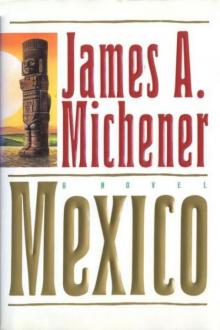 Mexico
Mexico The World Is My Home: A Memoir
The World Is My Home: A Memoir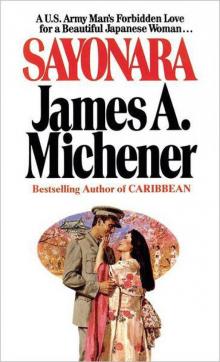 Sayonara
Sayonara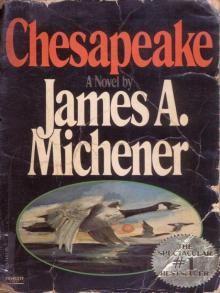 Chesapeake
Chesapeake The Novel
The Novel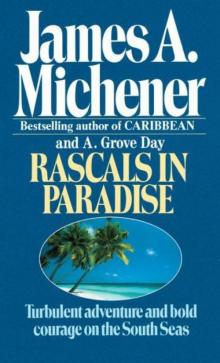 Rascals in Paradise
Rascals in Paradise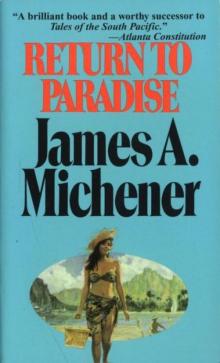 Return to Paradise
Return to Paradise Presidential Lottery: The Reckless Gamble in Our Electoral System
Presidential Lottery: The Reckless Gamble in Our Electoral System The Source
The Source Poland
Poland Space
Space Caravans
Caravans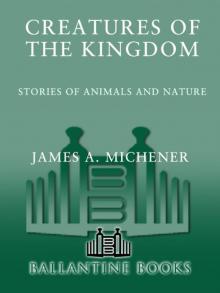 Creatures of the Kingdom: Stories of Animals and Nature
Creatures of the Kingdom: Stories of Animals and Nature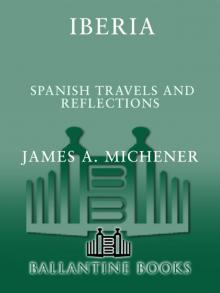 Iberia
Iberia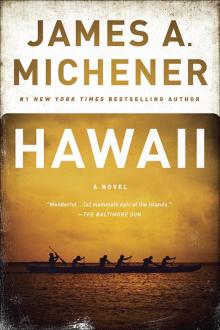 Hawaii
Hawaii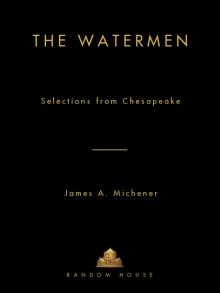 The Watermen: Selections From Chesapeake
The Watermen: Selections From Chesapeake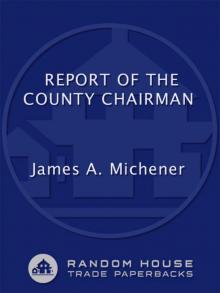 Report of the County Chairman
Report of the County Chairman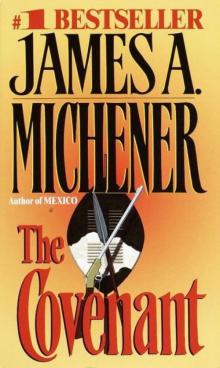 The Covenant
The Covenant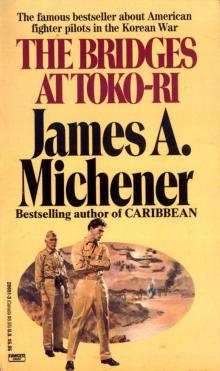 The Bridges at Toko-ri
The Bridges at Toko-ri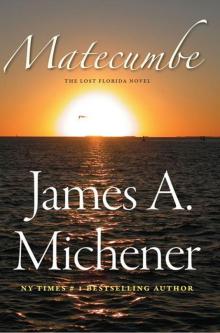 Matecumbe
Matecumbe Journey: A Novel
Journey: A Novel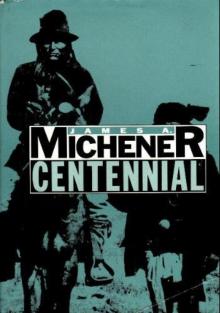 Centennial
Centennial Sports in America
Sports in America Texas
Texas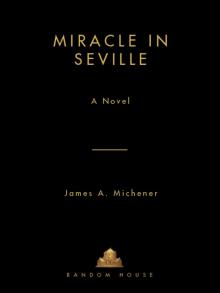 Miracle in Seville
Miracle in Seville This Noble Land: My Vision for America
This Noble Land: My Vision for America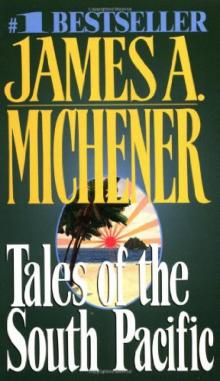 Tales of the South Pacific
Tales of the South Pacific Bridges at Toko-Ri
Bridges at Toko-Ri Space: A Novel
Space: A Novel Presidential Lottery
Presidential Lottery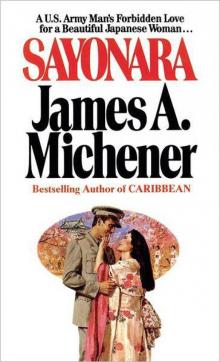 Sayonara: A Novel
Sayonara: A Novel This Noble Land
This Noble Land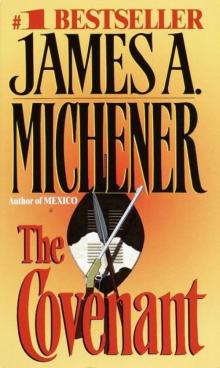 The Covenant: A Novel
The Covenant: A Novel Miracle in Seville: A Novel
Miracle in Seville: A Novel The Bridge at Andau
The Bridge at Andau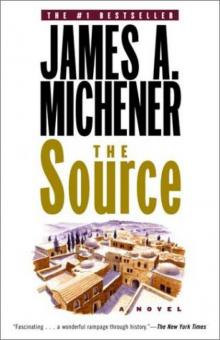 Source
Source The Source: A Novel
The Source: A Novel Journey
Journey Recessional: A Novel
Recessional: A Novel Legacy: A Novel
Legacy: A Novel The Bridges at Toko-Ri: A Novel
The Bridges at Toko-Ri: A Novel Poland: A Novel
Poland: A Novel